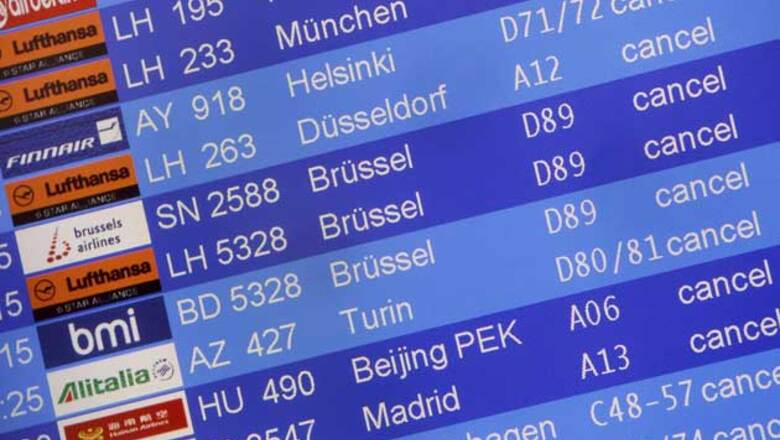
views
Brussels: Hundreds of flights between Europe and North America were either delayed or canceled on Saturday due to the spreading cloud of volcanic ash stretching across much of the northern Atlantic, the European flight control agency said.
Flights had to be rerouted north over Greenland or south over Spain to avoid the 1,200-miles (2,000-kilometer) -long cloud stretching from Iceland to northern Spain, Eurocontrol said. This will increase flying times by about an hour in either direction.
"We assume that basically most of the trans-Atlantic flights will have to be rerouted on Saturday," Eurocontrol spokeswoman Kyla Evans said. "We expect substantial delays because of that."
Approximately 600 airliners make the oceanic crossing every day. Around 40 percent will be rerouted southward and the rest will skirt Iceland from the north.
The plume of ash also forced the closure of 15 airports in northern Spain on Saturday and is expected to expand into southern France during the day, carried along by Atlantic winds. Spain's main international airports of Madrid and Barcelona were expected to remain open.
Just over 100 flights were canceled at mainland Portugal's three international airports on Saturday because of the ash cloud, the national airport authority ANA said.
Aer Lingus canceled flights from the United States to Dublin, citing the exceptionally circuitous routes to get around the cloud.
"During the day, the area affected by volcanic ash is expected to extend from Iceland, south to Portugal and possibly as far east as Barcelona and Marseille," a Eurocontrol advisory said.
But relief appeared to be on the way, because meteorological charts showed that the area of predicted high ash concentration may move westward into the ocean -- away from the Spanish and Portuguese coasts -- on Saturday night.
In Paris, Jerome Lecou, an engineer with the national weather service Meteo France, said that the Civil Aviation authority was doing a flight evaluation with an aircraft equipped with sounding devices to gather a maximum of information in order to determine whether the closure of some airports may be warranted.
He said it remained unclear whether the annual Cannes Film festival which opens Wednesday would be affected by the flight disruptions. Normally, stars, journalists and fans descend in hordes on the Riviera site.
Until Eyjafjallajokul (pronounced ay-yah-FYAH-lah-yer-kuhl), the volcano in southern Iceland, stops its emissions, the key to the future course of Europe's ash crisis will be the prevailing winds. The eruption of the glacier-capped volcano has shown no signs of stopping since it began belching ash April 13. It last erupted from 1821 to 1823.
Since the ash is reaching altitudes of up to 35,000 feet (10,000 meters), right in the path of most trans-Atlantic flights, it will effectively block the usual routes. Eurocontrol said this would cause significant congestion, particularly in the airspace over Spain and Portugal where many of the diverted flights are heading.
A trans-Atlantic trip from New York to Paris, which is normally about 5,800 kilometers (3,600 miles) long, could add on another 1,000 kilometers (600 miles) by being diverted over the Iberian Peninsula.
An Air France flight from Boston arrived in Paris Saturday with a delay of more than four hours.
Tracks across the Atlantic normally follow "great circles" — the shortest path between two points on the globe. They are determined each day by air traffic control centers on both sides of the Atlantic, generally depending on the jet stream from North America to Europe.
Planes flying the track system typically follow each other in 10-minute intervals and at altitude levels 1,000 feet (300 meters) apart, in order to maintain safety in airspace which is beyond the range of radar control.


















Comments
0 comment